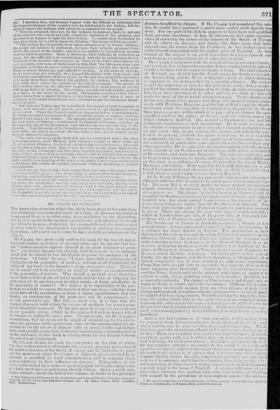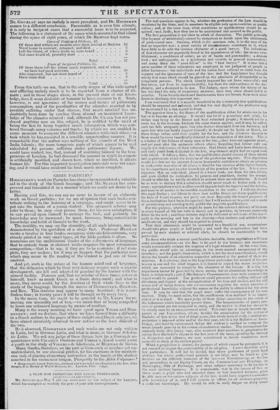DR. CLARK ON CLIMATE,
Tier increasing attention which has lately been given to the considera- tion of climate as a remedial agent in is class of diseases for Avhich it is supposed there is no other cure, is as gxatif:,-ing to the philonthro- pist as it is useful to the medical practitioner: and although Vie result hits hitherto been unsatisfactory, tni ocettnntlotion of asueval ions and of facts which the investigation has produced, and may be exrected to produce, will enable us to come to more definite conclusions on the sul-jeet.
Dr. CLARK has professedly written his book for the use of unpro- fessional readers as well as of medical men, and he has for that rea- son " endeavoured to express himself in as plain language as possi- ble:" yet such is the mystery of craft, that he appears to he actually afraid lest he should be too intelligible to please the members of the profession. "I trust," he says, " I have succeeded in making myself intelligible to the generality of readers, without at all diminishing the utility of my book to the members of my own profession." There is not or ought not to be anythine- in medical science incomprehensible to the generality of readers. Why should a medical man, therefore, waver between the desire of being useful and the fear of stripping his profession of its mystery,—or in other words, of being intelligible to the generality of readers ? We believe it is unpalatable to the pro- fession as a body to expose the secrets of their vocotion,—whether from a real love of the mysterious, or from a vague apprehension that the thgnity or emoluments of the profession will be compromised, we do not pretend to say. But this we must sty, it is 1ll112 that the learned obscurity with which the science of medicine has been incum- bered should be removed. To the true man of science its removal can do no possible injury, whilst to the ignorant it will no longer alfOr.d the means of hiding the asses' ears. We must add, for Dr. CLARK'S Consolation, that he needs not be afraid of diminishing by his disclo- sures the practice of the profession, since he has accompanied his ob- servations on the effects of climate with so many doubts and distinc- tions and qualifications, I hat no invalid would consider himself justified on the authority of this hook in stirring from his own fireside without the aid of a medical crutch.
Dr. CLARK divides his work into two parts: in the first of which "lie has endeavoured to determine the general physical characters of the milder climates of the South of Europe and of England—to point out the manner in which the climate of dillitrent places resorted to by invalids is modified by local circumstauces, and to compare these places relatively to their influence on disease." This portion of the work is illustrated by a series of meteorological tables, the compilation of which must haNexequired considerable labour. In the second part, which occupies about one half of the volume, he treats of the principal * The Influence of Climate in the Prevention and Cure of Chronic Diseases, more par-
ticularly of the Chest and ,Digestive Organs, Szc. )3y Janice Claris, M.D. London, I 182. Underwood.
diseases benefited by climate. If Dr. CLARK had completed this out- line, he would have produced a much more verfect work than he has clone. For one part of his task he appears to hove been well qualified from personal experience : he has, he informs us, had ample opportu- nities of observing- the nature of the climate of the South of Europe and its effects on disease; and during the three years that have elapsed since his return from the Continent, he has endeavoured to make himself acquainted with the milder parts of England. As this branch of the subject is of great importance to a large class of our countrymen, we proceed to notice it somewhat in detail.
Dr. s 'LARK commences with the consideration of our own climate ; and certainly it is judicious to examine, before syncline-invalids abroad, whether we have not the required eliniftte at. home. The mild climates of Emiand hire divided into the South coast, the South-west coast, the Lands End, and the West of Eut:land ; eaeh of which districts is supposed to he distioguished by a peculiar climate. The author regrets the deficiency of data for this part of his work ; bet, consider- ig that the climate and situation' of must of the districts examined by bum iinve been invest igatA by other authors, we think 1;e has not made the most of the meterials within his reach. To the South coast he has only devoted ten pees ; and these arc: occupied almost exclu- sively with Hastings, Brighton, anti the Isle of Wight ; and the South- west coast (with the exception of ('ornwall,) is despatched in about three pages,—spaces within which it is imp;?ssib1e to discuss the geo- graphical position, the nature of the soil, and the various causes by which climate is modified. Ills account is illelViOre and his deductions unsatisfactory and inconclusive. Ile is more copious on the subject of ten:I:endure (a iii' st important element of climate) than on any other : but, itt our opinion, the author, and indeed the pro- fession ill general, ollribute too mech importance to more warmth in pulmonary disease:: dryness and equahady of temperat hire are, we are convinced, Of much more consetputeue in such disc.:1,es than any other 1)1-(u:cities. Dr. CLARK gtics rho decisive opinion as 1 o the merits of the climate of the South coast in auctions of the Cles I is doubtful of Devonshire. and condemns Penzance. The cider in which they are to be preferred, however, he thinks, although he speaks with diffidence on the point, is as follows,—Terquay, IroderclifF in the Isle of "Wight, Hastings, and Clifton. With rveard to 17nderelie, Ibis opinion is not time:led on metereological olweivation : but. we think it pilaff:He iltat it will ofihrd as good a clinntie es we have in Englatel.
Of the South of Europe Dr. Ct. rtes spetths with greater ant horitv,*
although with too little decision to be Diticil nitre 11:fit ItellAtiVe!V use- ful. But even this is no sii;I:ht merit to warn :V4'flillst an improper climate resorted to by invaids, is the next geed thing to 'minting out a proper 11111. The eft dial in the South-west of Franee is said to resemble the South-west coast of Enteland.—soft, relaxing, and :subject to inuch rain : the menu zumnal temperature of the former is 51 de- grees, being; -I degrees high ter than the South-;vast of England. Pau is the only place in this part of France of which ally particular account is given. There are during tine year 109 days itt which rain falls ; whilst at London there are 178, at nelzeeee 170, at Sidinouth 135 at Home 11 7, at 'Madeira 73, and at .1I:e.sel:es The South-east of France is deeide(fly c, ehael, ibeeeb :n too
general terms : it is cher:Icier:zed as dry. ;11 mai i re:, a ling. It
is perhaps, the driest district in Europe. TH.., (lisiribution of heat throughout the year in this and the ;oleo' di• nes will appear from the following. statement : the mean C.:, the wannest and coldest months is here 3:5 degreas, iii the nVvst of England it is 2s degrees, at London 213 degrees, in the South-nee:t of Enginnd 22 de- grees, at Gael /O 21 degrees, at Torquay 20 degmtts, at Penzance 18 do tees, and at. Madeira _4 degrees. Of ail the plaeas in this Fart of France, the most famous, and the lt ast. deserving, is Merl pelice : it is indeed remarkable how it ever obtained its undeseeved reputation. From Nice little benefit is to be exeoeted : in o titer, city of cases it is mote injurious iheo: beneficial. Naples in its eoeetill chariostsr re- sembles Nice ; though mild in the autumn and while:, in spring it is subject to cold, sharp, irritating wirds : it is no planet, therefore, for consumptive patients. The climate of Pisa is heavy and damp : not so warm as Rome in winter, and Intim- in summer. Of Rome Dr. CLARK has a more favourable opinion then mu other clii.nale of Italy; but though mild and soft, it is rather relaxing and opt ressiae : in fact, it must be admitted to hen damp climate. Notwithstending the humitlitv, how- ever, tire author thinks that. in the early stages of consumption limn° is favourable, although in the more advanced perieds of the disease, he did not find that it produced any benefit. In 1)1-m:ell:el affect ions, espe- cially when accompanied by much irritation, it is stated to be generally beneficial.
Such is the brief summary of what, according to this author, is to
be expected from European climates in egeetions of the ebest : mid
surely nothing can be more in:sells foetery dislieartenin7. What, Dr. Go URLAY says no malady is more prevalent, and Dr. HEINEKEN comes to a different conclusion. Favourable as is even this climate, it is only in incipient cases that a successful issue is to he expected. The following is a statement of the cases which occurred in that island during the space of eight years, of which Dr. ItEstroiy kept notes.
Cases of Confiratel Phthisis, 47.
Of these died within six months after their arrival at Madeira 32 Went home in summer, returned, and died Left the island, of whose death we have heard
Not since heard of, probably dead 3 Total 47
Cases of Incipient 33.
Of these there left the island much improved, and of whom we have had good accounts 26 Also improved, but not since heard of 5 Have since died 4 Total . . . . . 35
From this table we see, that in the early stages of this wide-spread and afflicting malady much is to be expected from a change of cli- mate ; and in those stages alone, in the present state of our know- ledge, does it seem desirable or humane to have recourse to it. Such, however, is our ignorance of the causes and nature of pulmonary consumption, and of the peculiarities of the climates resorted to by invalids sufferino." under that disease, that much mischief has un- doubtedly been done by sending them abroad on insufficient know- ledge of the climates selected : and, although Dr. CLARK. has not pro- . duced anything new on this subject, he is entitled to the merit of being the first to bring together much information which was scat- tered through many volumes and tracts; by which we are enabled in some measure to compare the different climates with each other,--a task which he has executed in a sensible, unpretending manner. It is remarkable that the author says nothing of the climate of the West India Islands ; the more temperate parts of which appear to be well calculated for persons sutcring under pulmonary disease. We could have wished, too, that, instead of confining himself to the tem- perature of London, he had discussed the manner in which its climate is artificially modified, and shown how, when so modified, it affects human life. For this important investigation materials were not want- ing, and it would have rendered his book much more complete.



















 Previous page
Previous page